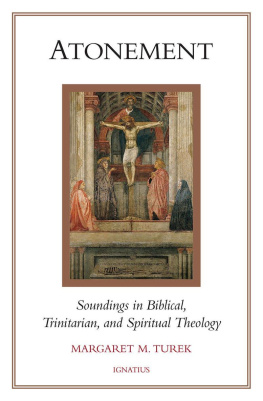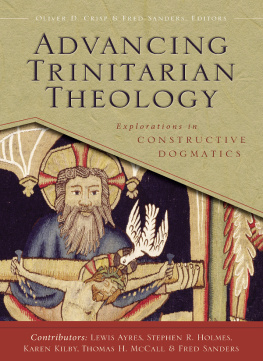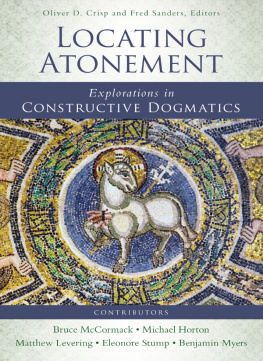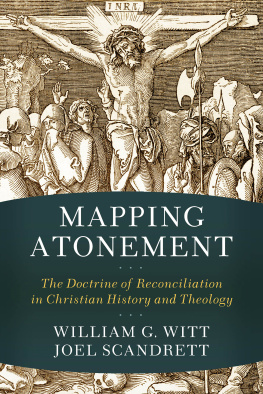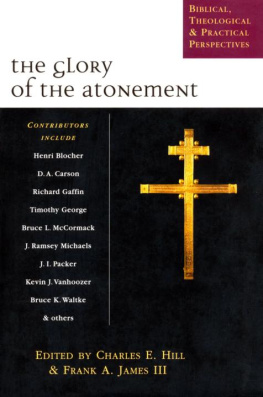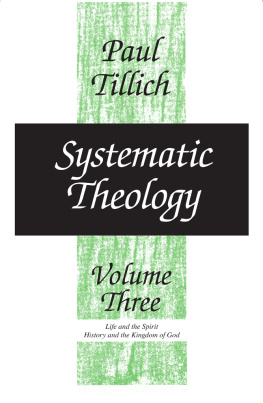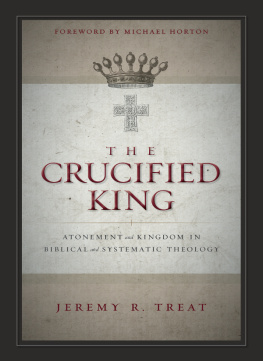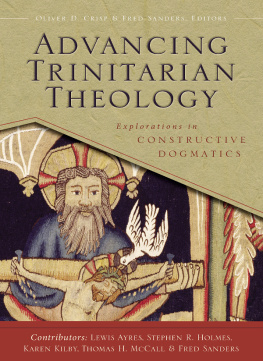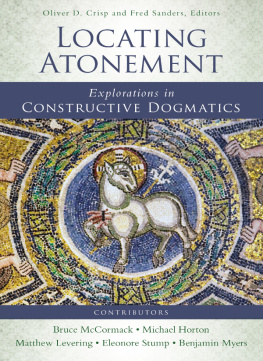Margaret Turek - Atonement: Soundings in Biblical, Trinitarian, and Spiritual Theology
Here you can read online Margaret Turek - Atonement: Soundings in Biblical, Trinitarian, and Spiritual Theology full text of the book (entire story) in english for free. Download pdf and epub, get meaning, cover and reviews about this ebook. year: 2022, publisher: Ignatius Press, genre: Religion. Description of the work, (preface) as well as reviews are available. Best literature library LitArk.com created for fans of good reading and offers a wide selection of genres:
Romance novel
Science fiction
Adventure
Detective
Science
History
Home and family
Prose
Art
Politics
Computer
Non-fiction
Religion
Business
Children
Humor
Choose a favorite category and find really read worthwhile books. Enjoy immersion in the world of imagination, feel the emotions of the characters or learn something new for yourself, make an fascinating discovery.
- Book:Atonement: Soundings in Biblical, Trinitarian, and Spiritual Theology
- Author:
- Publisher:Ignatius Press
- Genre:
- Year:2022
- Rating:3 / 5
- Favourites:Add to favourites
- Your mark:
- 60
- 1
- 2
- 3
- 4
- 5
Atonement: Soundings in Biblical, Trinitarian, and Spiritual Theology: summary, description and annotation
We offer to read an annotation, description, summary or preface (depends on what the author of the book "Atonement: Soundings in Biblical, Trinitarian, and Spiritual Theology" wrote himself). If you haven't found the necessary information about the book — write in the comments, we will try to find it.
Margaret Turek: author's other books
Who wrote Atonement: Soundings in Biblical, Trinitarian, and Spiritual Theology? Find out the surname, the name of the author of the book and a list of all author's works by series.
Atonement: Soundings in Biblical, Trinitarian, and Spiritual Theology — read online for free the complete book (whole text) full work
Below is the text of the book, divided by pages. System saving the place of the last page read, allows you to conveniently read the book "Atonement: Soundings in Biblical, Trinitarian, and Spiritual Theology" online for free, without having to search again every time where you left off. Put a bookmark, and you can go to the page where you finished reading at any time.
Font size:
Interval:
Bookmark:
ATONEMENT
ATONEMENT
Soundings in Biblical,
Trinitarian, and
Spiritual Theology
IGNATIUS PRESS SAN FRANCISCO
Unless otherwise noted, Scripture quotations (except those within citations) have been taken from the Revised Standard Version of the Holy Bible, Second Catholic Edition, 2006. The Revised Standard Version of the Holy Bible: the Old Testament, 1952, 2006; the Apocrypha, 1957, 2006; the New Testament, 1946, 2006; the Catholic Edition of the Old Testament, incorporating the Apocrypha, 1966, 2006, the Catholic Edition of the New Testament, 1965, 2006 by the Division of Christian Education of the National Council of the Churches of Christ in the United States of America. All rights reserved.
Scripture quotations in this work, unless otherwise noted, are from the New American Bible, revised edition 2010, 1991, 1986, 1970 Confraternity of Christian Doctrine, Washington, D.C.
Excerpts from the English translation of the Catechism of the Catholic Church for use in the United States of America copyright 1994, United States Catholic Conference, Inc.Libreria Editrice Vaticana. English translation of the Catechism of the Catholic Church: Modifications from the Editio Typica copyright 1997, United States Conference of Catholic BishopsLibreria Editrice Vaticana. Second edition (updated 2016). Used with permission.
Quotations from encyclicals and other Vatican documents, unless otherwise noted, are taken from the Vatican website.
Cover art: The Holy Trinity with the Virgin,
Saint John the Evangelist, and Donors (detail)
Masaccio, Tommaso di Ser Giovanni (14011428)
Fresco, Santa Maria Novella, Florence, Italy
In the Public Domain, Wikimedia Commons Image
Cover design by Roxanne Mei Lum
2022 by Ignatius Press, San Francisco
All rights reserved
ISBN 978-1-62164-504-7 (PB)
ISBN 978-1-64229-212-1 (eBook)
Library of Congress Control Number 2021940698
Printed in the United States of America
To my students
Contents
Acknowledgments
I offer my sincere thanks to Adrian Walker for his careful reading of an earlier version of the manuscript; I profited greatly from his insight, suggestions, and encouragement. Thanks are also due to Angela Franz Franks, Douglas Bushman, and Anthony Lilles, who read and commented on earlier drafts of parts of the book. I am grateful as well for the fine work of my editor, Vivian Dudro, and the supportive collaboration of all the folks at Ignatius Press.
Sections of chapters 1 and 2 were presented as lectures at two symposiums sponsored by the Saint John Paul Center for Contemplative Culture, led by Anthony Lilles; I am indebted to all the participants for their helpful feedback and encouragement. Chapters 1 and 2 are also based on earlier articles: In this way the love of God was revealed (1 Jn 4:9): Atonement as a Patrogenetic Process: Part 1: The Old Testament, Communio: International Catholic Review 47.1 (Spring 2020): 747; and In this way the love of God was revealed (1 Jn 4:9): Atonement as a Patrogenetic Process: Part 2: The New Testament, Communio 47.2 (Summer 2020): 399440.
Finally, I owe a debt of gratitude to my family and friends who supported me with their love and prayers while I was preoccupied with this project. Special thanks to the rascals behind the surprise party when all was finished.
Introduction
The perennial value of a theology of atonement
In this way the love of God was revealed to us:... that he... sent his Son as expiation for our sins (1 Jn 4:910). The theme of atonement takes us to the very heart of the mission of Jesus Christ. Revealing the love of God as a mortal man, while bearing the conditions of sin-wrought estrangement, Gods Son atoned for the sins of the whole world (1 Jn 2:2). Atonement is the form that the love of God takes in his Son, Jesus Christ, under sin-wrought conditionsa love than which no greater can be conceived.
In Johns Gospel, those who observed Jesus weeping over the death of Lazarus correctly interpreted the meaning of his tears: See how he loved him (Jn 11:36). This recapitulates the confession of faith in response to Jesus mission, which culminates in his own Passion and death: See how much he loves us! This is the key interpretation of the Cross event, which Jesus reveals to his disciples, whom he calls friends: No one has greater love than this, to lay down ones life for ones friends (Jn 15:13). And the apostolic Church makes this central to her profession of faith: God proves his love for us in that while we were still sinners Christ died for us (Rom 5:8). The way we came to know love was that he laid down his life for us (1 Jn 3:16). A theology of atonement is not complete unless it issues from and serves to elicit the profession of faith: See how much God loves us!
Clearly, the love of God made manifest in Christs atoning Passion stands at the center of Christian witness. Christians in every age should know and witness to the God of Jesus Christ in precisely these terms. Not only that, but this witness is to be directed to all mankind: The Church, following the apostles, teaches that Christ died for all men without exception: There is not, never has been, and never will be a single human being for whom Christ did not suffer.
The modern aversion to a theology of atonement
It should be cause for concern, therefore, that a conspicuous characteristic of much of contemporary theology is the absence of efforts to explain the Cross event as a work of atonement. Despite the fact that the Churchs Scripture, doctrine, and worship all sanction the faith-conviction that Christ by his Passion and death atoned for sin, once for all (Heb 9:26), this understanding of the Cross event has largely fallen out of favor. Among theologians, one can detect an unmistakable reserveeven embarrassmentwith regard to the idea. And things are not hugely different in the world of parish faith formation. On most occasions when the Scripture readings at Mass testify expressly to the atoning purpose of Christs Cross, the priest or deacon proves masterful in avoiding the subjecteven on Good Friday, when the prophecy of the Suffering Servant (Is 53) is read as prelude to Saint Johns Passion account.
We may assume that behind this pattern of avoidance is the view that the message of the Cross as atonement clashes with the sensibility of many today. Nonetheless, just as Christ had to challenge the expectations and mindsets of his interlocutors, so Christians may not sidestep the task of challenging and transforming the perspectives of their audiences.
For his part, Pope Benedict XVI is alert to the trend among Christians to distance themselves from the doctrine of the Cross as atonement. Indeed, he challenges it in the first volume of his masterwork, Jesus of Nazareth, where he observes:The idea that God allowed the forgiveness of sins to cost him the death of his Son is widely seen as repugnant. Benedict then goes on to identify reasons for this trend. The first reason he singles out is the trivialization of evil in which we take refuge.
Besides this inaccurate assessment of sin, another troublesome reason for the modern aversion to the idea of atonement lies in a distorted depiction of God the Fathers role in the Cross event. Ever since the seventeenth century, and indeed well into the twentieth, a trend arose among theologians and preachers to portray God the Father as a celestial child abuser vis--vis Christ crucified, as someone who unleashes violent fury on his Son for sins of which his Son is innocent. Such a portrayal of the Father gained a foothold in Catholic circles under the influence of Jansenism. Here are but two examples. The first is from a sermon by a Catholic bishop, Jacques-Bnigne Bossuet: God the Father
beholds him [Jesus] as a sinner, and advances upon him with all the resources of his justice.... I see only an irritated God.... The man, Jesus, has been thrown under the multiple and redoubled blows of divine vengeance.... As it vented itself, so his [the Fathers] anger diminished.... This is what passed on the Cross, until the Son of God read in the eyes of his Father that he was fully appeased....When an avenging God waged war upon his Son, the mystery of our peace is accomplished.
Next pageFont size:
Interval:
Bookmark:
Similar books «Atonement: Soundings in Biblical, Trinitarian, and Spiritual Theology»
Look at similar books to Atonement: Soundings in Biblical, Trinitarian, and Spiritual Theology. We have selected literature similar in name and meaning in the hope of providing readers with more options to find new, interesting, not yet read works.
Discussion, reviews of the book Atonement: Soundings in Biblical, Trinitarian, and Spiritual Theology and just readers' own opinions. Leave your comments, write what you think about the work, its meaning or the main characters. Specify what exactly you liked and what you didn't like, and why you think so.

